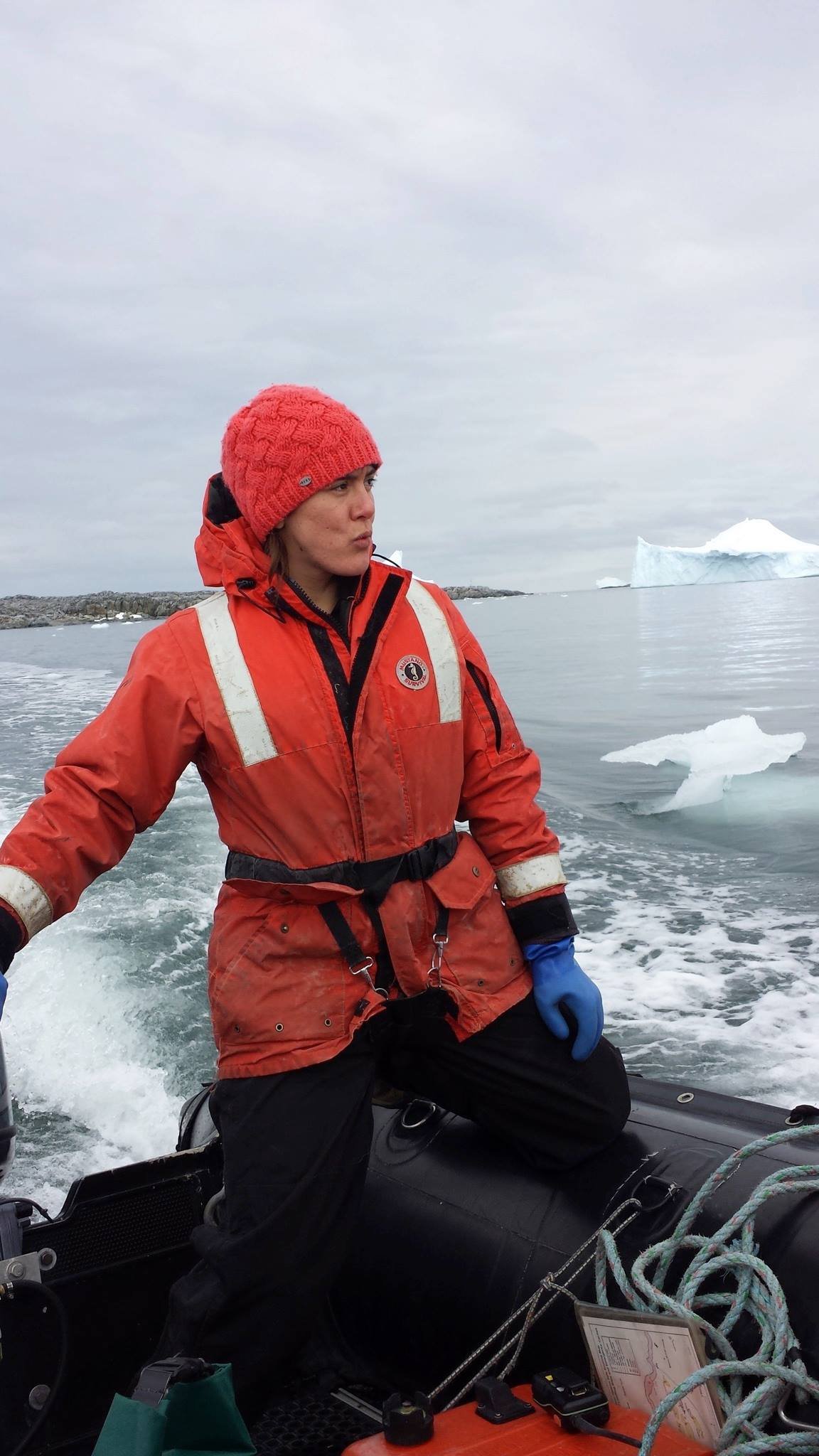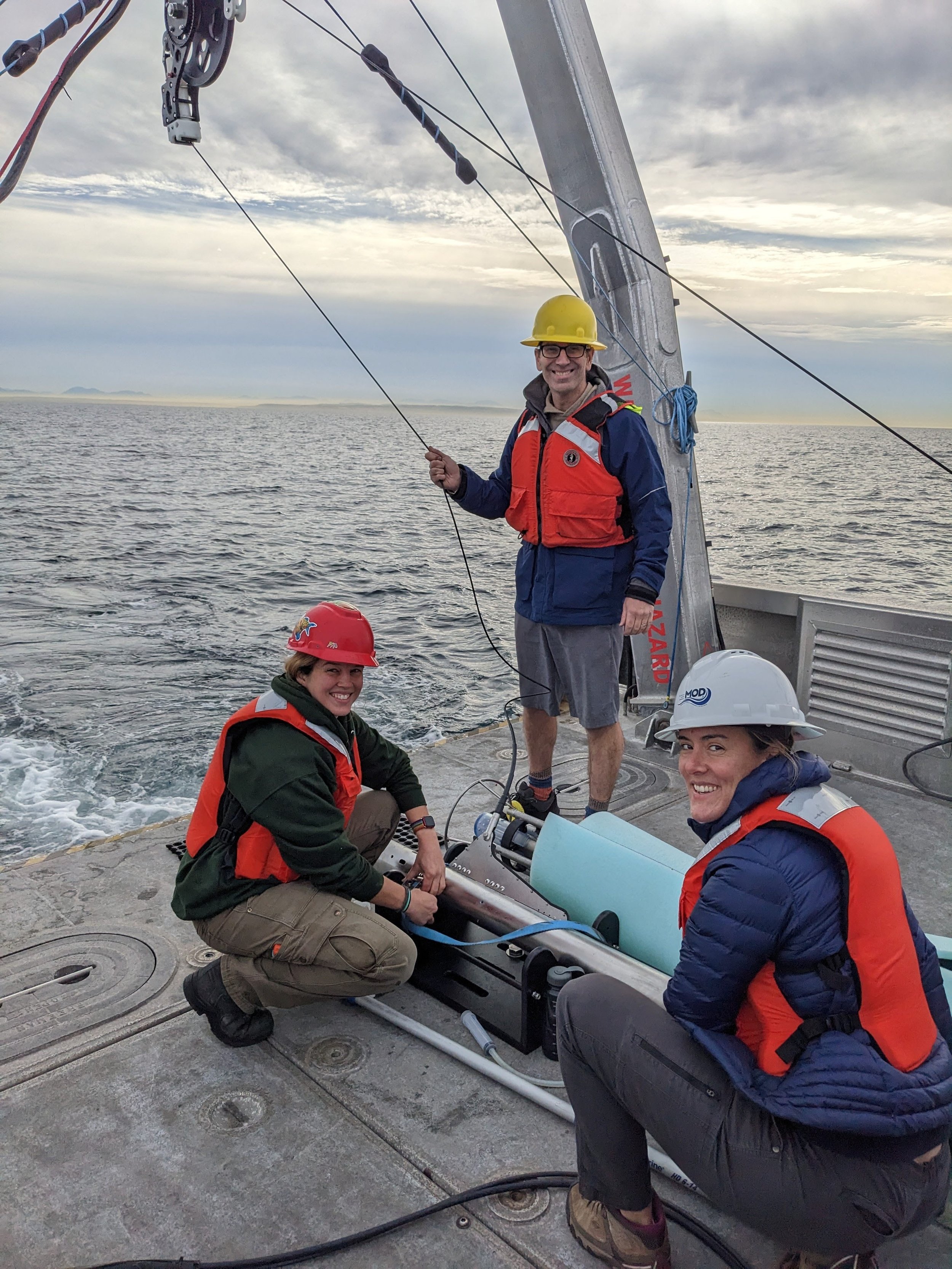What is your background and what are you working on at the moment?
I did physics at UC Santa Barbara for my undergrad, but I sort of knew that theoretical physics wasn’t for me. I did a couple of internships in particle physics labs and I remember my classmates making fun of me when I’d take a paper outside to read. When I said I wanted to go to Antarctica one day, they thought that was the craziest thing they’ve ever heard! I ended up taking some earth science classes my senior year, including one on oceanography. I remember seeing pictures of people on boats and thinking “that’s their job – how do I get that job?”. After graduation I did a SEA semester and after that I knew that it was oceanography I wanted to do. However, during that trip I realized that there was so much more to oceanography than I realized, and I needed some more time to figure out which part of it I liked the most. Thus, I spent about a year working in a lab at UC Santa Cruz under a researcher who was part of the Long-Term Ecological Research Project at Palmer Station in Antarctica. I did a project looking at a at surface CO2 and O2 fluxes on the shelf of the Antarctic Peninsula. I later applied to graduate school with a bunch of different professors who were also part of that project, and I was lucky enough to get into Rutgers work with Oscar Schofield who led the phytoplankton component of the Palmer LTER. My work had a cool combo of biology and physics where we were looking at what physical factors in the ocean control phytoplankton distribution around Antarctica using gliders. My thesis was all about heat transport via eddies on the Antarctic shelf. When I was looking for postdocs focused on the polar regions I came across a great website that Jen and Matthew had set up for their ArcticMix project. I applied and here we are.
Today I still feel a pull towards the polar regions, but I’ve also sort of ended up in the turbulence world. I do a lot of work on bottom boundary layer dynamics and mixing, for example as part of the BLT [Boundary Layer Turbulence] and TLC [Turbulence in La Jolla Canyon] projects. I’ve also gotten funded for a project in Antarctica looking at turbulence, so it sort of feels like I’ve come full circle.
What keeps you excited and interested in working in the field of oceanography?
Getting to go sea is definitely a huge draw for me. I like the break from all the screen time that is part of our normal day-to-day routine and getting to tinker with things. Plus, I really love the camaraderie that comes with hanging out with your coworkers 24/7. We typically end up getting a bit loopy and there are often a lot of fun pranks and inside jokes. I’m also excited by the thought that there are still so many things about the ocean that we don’t understand particularly well. Yet these things are super relevant and important for climate models and for us to understand what will happen to the ocean in a changing climate. That helps me stay motivated on the days I’m just staring at my screen all day struggling with some seemingly insignificant piece of analysis.
When you were a kid, did you expect to be a scientist?
Yes, I think so. Both of my parents are scientists, biochemists, and it wasn’t until my junior year of college that I realized that I actually didn’t have to get a PhD and went through a phase of saying “I’m not getting a PhD”. But I think I always assumed I’d eventually end up in science somehow. I was very into astronomy for a while. Architecture was something else that called me for a while, in elementary school I was always drawing blueprints of houses. But math and science were always what attracted me the most.
Were there any particular things from your childhood that drew you to study the ocean?
I just love the ocean. When I was a kid, we spent a lot of time by the sea in Portugal where my dad is from. I just loved getting tossed around by the waves. We also spent time at Cape Cod near where my mom is from. It feels like a completely different ocean, on the Bayside it feels like you can walk out for a mile and still be only knee deep.
What skills or abilities do you think are useful when going into oceanography?
I think a lot about something that one of my advisors said to me when I was studying for my qualifying exam in grad school. I remember, we were passing each other in the hallway, and he was asking me how it was going, and I said with frustration: “It’s hard, I feel like I don't know anything!” To which he replied: “great, that means you're studying hard enough”. I think that there are a lot of times in this job where you get really stuck, and it is so easy to feel defeated, thinking you’re not cut out for it. But it's important to remember that you're not going to be an expert on everything. If you’re interested and curious enough to keep going, eventually you’ll figure something out. You’ll learn something and it is rewarding, but there will always be so much more that you’ll never know and that is part of what makes it exciting. Don’t be afraid to ask others for help and remember to every now and again check in on how far you’ve come. It’s sometimes easy to lose track of your own progress when you get stuck in your research. Being an oceanographer can also mean a lot of not-so-glamorous computer work on your own in between the thrills of fieldwork. That is why I think it is also important to practice reaching out and connect with your peers, that helps me stay motivated and feel inspired.
The last thing I’ll say is that a little bit of perseverance and discipline also helps a lot on those days you feel frustrated. “It is ok to suck, but it is not ok to skip” is something I heard once and keep reminding myself of. Some days you won’t feel like it, but you can’t just wait for inspiration to strike and for you to “feel ready”. You have to set yourself up for it by putting in the hours, that’s how you have a chance at actually finding flow in your coding or writing.
What does your typical workday look like?
I sit down at my desk and wait for inspiration to come? Actually, on the days I’m on land I really try to stick to a routine where I use my mornings for writing and data wrangling because that’s when I’m at peak brain energy. I try to save afternoons for meetings or doing things in the lab. If I’m at sea it’s of course different, then you’re typically on for 12h manning the profiling winch or doing some other sampling, and then there’s data visualization etcetera. I enjoy that slightly different flow of your day when you’re at sea, it’s very stripped down to the essentials.
What drew you to Scripps?
I think that when I was looking for postdocs, I was mostly looking for good people that I wanted to work with, and the location didn’t necessarily matter that much. But when I got here, I realized that I had lucked out because Scripps, and the MOD lab in particular, is not only full of so many great people, but there were also so many cool projects. I can do whatever suits my fancy really. I can tinker with instruments and learn from the engineers, and everyone is so fun and helpful. It’s a pretty amazing place to work.
Is there a particular scientist/person/thing that inspires you?
My dad has always really inspired me. He is always so curious and at the same time incredibly disciplined. He is a biochemist who is also really into astrophysics, he built a telescope when we were kids and like taught us all about stars, and whenever I go home, I'll find him watching YouTube videos about quantum physics or a myriad of other topics. But more importantly, he’s a very well-rounded person, for example, he plays the piano and swims almost every day. That balance between being very professional and good at what you do for work, and still have a lot of other interests and generally be a good human being, that is inspiring to me.
Do you have a fun fact that you'd like to share that not everyone knows about you?
I really love to sing. I'm still very nervous singing around other people but I sing and play the guitar. My dad played a lot of classical and jazz piano when I was growing up, so I’ve sort of always been surrounded by music. And if you ever were to see me driving in my car on the freeway belting songs, that's probably the truest version of me. Typically, it’s something by Sara Bareilles, lots of long notes that are fun to hold.
Written by Kerstin Bergentz





